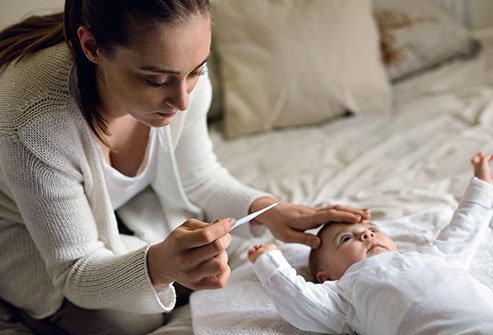When Should You Worry About a Baby's Fever?
- When to Call a Doctor
- When to Call 911
-
Treatment at Home
- How to manage your baby's fever at home
Fevers can be scary for many parents, especially if you are a first-time parent. How high is too high? Should you call a doctor right away?
All babies will eventually get a fever at some point, no matter how well you take care of them. It’s important to know what to do when that happens. Start with measuring your baby’s temperature using a thermometer. Although the most accurate is a rectal digital thermometer, you can use another device if you feel uncomfortable.
When to contact your baby's pediatrician
Fever is defined as a temperature over 100.4 degrees F. Normal body temperature is 98.6 degrees F, although this varies throughout the day and can differ by age and activity levels.
Contact your pediatrician if your baby is:
- Under 3 months old and has any kind of fever
- 3-6 months old and has a temperature up to 102 degrees F
- 6-24 months old and has a temperature higher than 102 degrees F for more than one day
You should also call your doctor if your baby displays the following symptoms:
- Refuses several feedings in a row
- Unusually sleepy or is hard to awaken from sleep
- Increased crankiness
- Belly button or genital area suddenly becomes red, oozes fluid, or bleeds
- Has a severe cough or diarrhea
- Vomiting (occasional spit up is normal, but projectile vomit 8 hours after feeding is not)
- Signs of dehydration, such as:
- Fewer tears
- Dry mouth
- Significantly fewer wet diapers
- Sunken soft spot
- Fewer bowel movements than normal or cries when having bowel movements
- Has a cold that is accompanied by:
- Difficulty breathing
- Nasal mucus that lasts for more than 10 days
- Ear pain
- Cough that lingers for more than a week
- Rashes develop
- One or both eyes are red or have discharge
When to seek emergency medical help
Some conditions require emergency medical help:
- Uncontrolled bleeding
- Seizures or abnormal body movements
- Accidental ingestion of large doses of medications or poison
- Worsening of difficulty breathing
- Unconsciousness
- Severe persistent pain
All parents should learn basic first aid, including cardiopulmonary resuscitation or CPR. Note down all emergency phone numbers and addresses and keep them handy.
How to manage your baby’s fever at home
If your baby’s fever is mild, you can try the following steps to bring the fever down:
- Wet sponge your baby’s entire body.
- Ensure that your baby drinks enough fluids or breastmilk.
- Keep your baby in a well-ventilated environment, preferably a cool one.
- Dress your baby in light, breathable clothes.
- Give your baby fever medication, such as acetaminophen, in consultation with your doctor.

